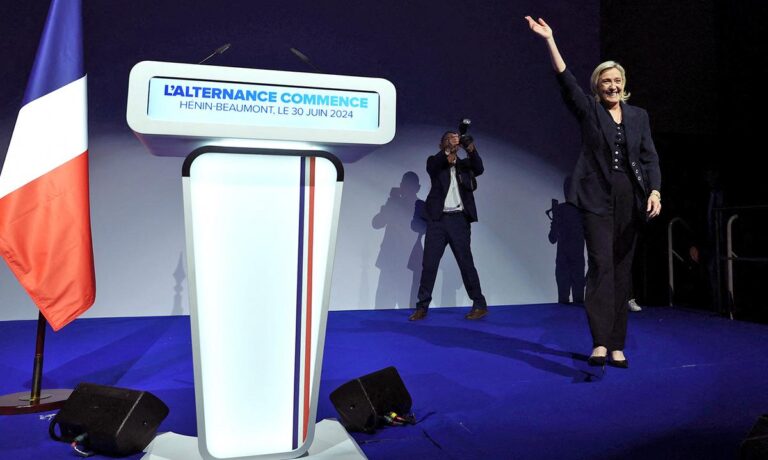Political uncertainty in France and the EU’s trade dispute with China are casting a shadow over European corporate earnings, even as companies are expected to perform better, investors said.
Second-quarter profits for STOXX 600 companies across Europe are expected to rise 2% and sales to grow 1.7%, marking the first growth quarter since the first three months of 2023, according to data from LSEG I/B/E/S.
Investors had been feeling more positive about European stock markets as the European Central Bank began easing monetary policy and the economic outlook improved, but French President Emmanuel Macron’s shock decision to call parliamentary elections has cast doubt on them.
Concerns about fiscal discipline under a new French government, whether right or left, are undermining confidence, as are fears about rising taxes and the minimum wage under a left-wing government.
Analysts have responded by cutting profit forecasts for France’s blue-chip companies, tempering expectations for European stocks over the past two weeks.
The STOXX 600 index, which hit a record high on June 7, the last trading day before President Macron dissolved parliament, has fallen 2.5% from that peak. France’s CAC 40, which is at its lowest since January, has borne the brunt of the selling.
“Seasonal patterns”
“This may be a typical seasonal pattern of downgrades heading into earnings season, but the signals aren’t as positive as they were in the last quarter,” said David Grohman, European equity strategist at Citigroup Inc.
“The fundamentals looked pretty good, but political risks were emerging.”
The earnings season will begin in earnest in mid-July, with Barry Callebaut announcing its results on July 11th, Richemont on July 16th, and ABB on July 18th.
Last week, Nike’s weaker-than-expected 2024 outlook and H&M’s dismal earnings report dented confidence in consumer demand.
Marine Le Pen’s far-right National Rally (RN) party won the first round of France’s parliamentary elections on Sunday, a major setback for Macron, though analysts note the party received a lower share of the vote than some polls had predicted.
“I think European markets were attracting a bit more interest from global investors until the European elections,” said Stephen Weil, head of euro zone funds at Union Investment.
Redemptions from French equity funds hit a four-week high in the past week, according to data from fund-flow data provider EPFR.Citi’s Grohmann said political risks are driving outflows from European funds, adding that “the French elections are a key issue.”
“I wouldn’t be surprised to see European companies start to acknowledge that this is a source of general uncertainty and that equities will become more sensitive to these political risks.”
Political risk is the main reason Citigroup recently downgraded continental European stocks to neutral in its global equity strategy.
Markets probably fear the most is a victory for the left-wing coalition New Popular Front (NFP), Weill said. “It’s much more unstable because there are so many parties in it, from the Greens to the far left to the center.” A win for the NFP would also mean higher labor costs for French companies, said Gilles Gibaut, head of European equity strategy at AXA Investment Managers. The NFP has pledged to raise the minimum wage by 14%.
Market Outlook
With European markets trading near all-time highs, investors are looking for reassurance from companies that were optimistic about the start of 2024.
“A lot of anecdotal evidence is that companies are sticking to their guidance and still have a positive view on the second half of the year,” said Mark Schuman, head of European large-cap mutual funds at DWS Group AG.
“With index levels now rising quite a bit, the market is becoming increasingly nervous about whether we will get any concrete evidence on the outlook for the second half of the year.”
Eurozone growth indicators are mixed.
While there were signs the contraction in euro zone manufacturing activity may have bottomed out, Citi’s economic surprise index, which measures how well economic data matches expectations, fell into negative territory for the first time since January.And a closely watched Ifo institute survey showed German business morale unexpectedly fell in June, raising concerns about the recovery of the euro zone’s largest economy.
Rising trade tensions between the European Union and China also add to the uncertainty.
The European Union has proposed imposing heavy tariffs on imports of Chinese-made electric vehicles to counter excessive subsidies, but the Chinese government has responded by launching an anti-dumping investigation into EU pork imports and taking countermeasures.
“Longer term, this is a big issue for Germany as a big exporter within Europe,” said Nathan Sweeney, chief investment officer for multi-asset at Marlborough.Mathieu Savary, chief European investment strategist at BCA Research, said he wanted companies to be aware of the growing uncertainty.
This is a premium article available only to our subscribers. To read over 250 premium articles every month,
You’ve reached your limit for free articles. Support quality journalism.
You’ve reached your limit for free articles. Support quality journalism.
You have read {{data.cm.views}} from {{data.cm.maxViews}} Free articles.
This is the last free article.

